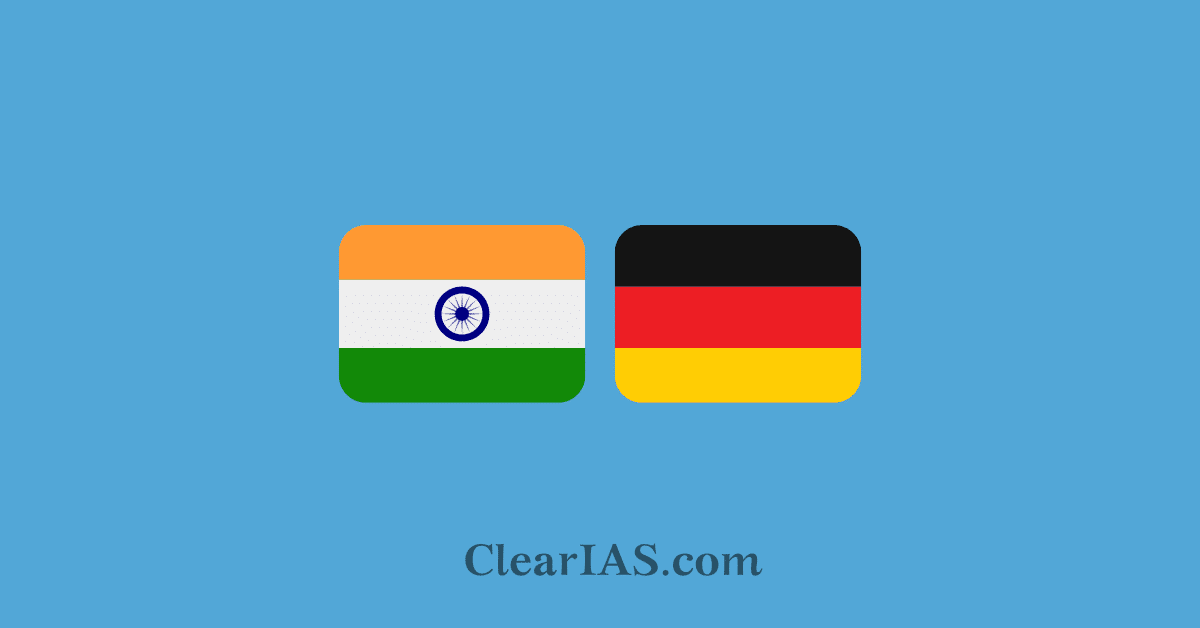
India-Germany bilateral relations are based on commercial, cultural, and technological cooperation. Both countries are members of the G4 grouping, making the bilateral relation global. Read here to know more about the bilateral ties.
The bilateral relations between India-Germany have become globally important due to the G4 strategic partnership between them.
Both countries along with Brazil and Japan have formed the Group of 4 countries to push for reforms and expansion of the UNSC.
In the last decade, both political and economic interaction between Germany has enhanced significantly. Today, Germany is amongst India’s most important partners both bilaterally and in the global context.
6th India-Germany Inter-Governmental Consultations
The 6th IGC was held in May 2022 and several important agreements were inked:
- The Green and Sustainable Development Partnership
- Triangular Development Cooperation will be implemented, in which India and Germany would collaborate on 3rd country programs.
- Migration and Mobility Partnership Agreement, in which the two nations will build a direct and encrypted connection between MEA and the German Foreign Office.
- Indo-German Development Cooperation Regarding Renewable Energy Partnership to strive toward the establishment of a green hydrogen center in India using German assistance.
- Joint Declaration on the beginning of the Comprehensive Migration and Mobility Partnership Agreement
- India and Germany have consented to a Joint Declaration on Forest Landscape Restoration.
- The two countries have agreed to create an Indo-German Green Hydrogen Task Force.
History of India-Germany relations
Commercial relations between India and Germany date back to the early 16th century when German trading companies from Augsburg and Nuremberg, developed new sea routes around Africa, as they sailed in search of precious stones and spices.
Thereafter, a number of German companies were established with the purpose of trading with India and other Asian countries in the 16th and 18th centuries.
- Werner Von Siemens, the founder of Siemens, personally supervised the laying of a telegraph line between Kolkata and London, which was completed in 1870.
- The first wholly-owned subsidiary of Bayer in Asia “Farbenfabriken Bayer and Co. Ltd.” was set up in Mumbai in 1896.
During world war I when India was part of the British crown. The independence activists of Indian armies sent to fight for the British forces against Germany sought German help in procuring Indian freedom, leading to the Indo-German conspiracy (1914-17).
The Allies’ war effort enlisted millions of British Indian volunteers during World War II. Subhas Chandra Bose launched a concerted effort to win India’s independence from Britain by enlisting the help of the Axis countries. The Indische Legion, which was primarily composed of British Indian prisoners of war and expatriates in Europe, was established to act as a liberating army for British-ruled India.
India is one of the first countries to end the state of war with post-war Germany in 1951 and among the first countries to recognize the Federal Republic of Germany (FRG).
The relationship, based on common values of democracy and rule of law has strengthened significantly in the 1990s following India’s economic liberalization and the end of the Cold War.
Trade and economic relations
Germany is India’s most important trading partner in the EU and its sixth most important trading partner worldwide.
Since India embarked on a course of reform and opened up its economy in 1991, the volume of trade between the two countries has increased rapidly.
Garments and textile products, chemical products, leather & leather goods, iron, steel and metal goods, electronic components, electrical components, pharmaceutical products, and auto components are major items of exports from India to Germany.
The key German exports to India include electrical generation equipment, auto equipment, complete fabrication plants, bearings, gear equipment, measurement, and control equipment, primary chemical products, synthetic material, machine tools, aircraft and iron and steel sheets, etc.
India-Germany Defence and security relations
India and Germany maintain an ongoing dialogue in the areas of commercial maritime security and cooperation in the field of anti-terrorism.
An anti-piracy cooperation agreement between the two nations was signed in 2006.
The Indian Navy and the German Navy conducted joint exercises in 2008 for the first time. In 2021, this joint exercise was carried out in the Gulf of Aden.
Fighter jets from the German and Indian air services participated in the recent multinational military exercise “Pitch Black 2022” in Australia.
Cultural and educational cooperation
Following the signing of an agreement between the two countries in 1956, Germany assisted in the establishment of the Indian Institute of Technology Madras and strengthened its cooperation, supply of technology, and resources over the years to assist in the institution’s expansion.
Both nations established the Indo-German Science and Technology Centre in New Delhi to promote joint research and development in energy, environment, coal, and water technologies.
India and Germany have signed an MoU regarding the teaching of the German language in Kendriya Vidyalaya schools in India and the reciprocal introduction of Sanskrit and modern Indian language in government schools in Germany.
Apart from traditional sectors, knowledge-driven sectors hold good potential for collaboration in the fields of IT, ITES, biotechnology, auto components, renewable energy, green technology, urban mobility & development and the entertainment industry.
Indo-German Science & Technology cooperation (IGSTC) started with the signing of the Intergovernmental S&T Cooperation Agreement in 1971 and 1974.
Today, Germany is one of the most important global partners of India for S&T cooperation.
Way forward
Germany had recognized India as a strategic partner in the Indo-Pacific region especially when the region is gaining importance in the geopolitics of the globe.
The India-Germany partnership has the potential to resolve global issues like food security, energy, defense security, and green development.
Germany will preside over the G7 in 2022, and starting in December 2022, India will preside over the G20. This provides a chance to work together and coordinate the efforts.
The India-Germany partnership in green development and tackling climate change is crucial to fulfilling sustainable development goals.
-Article written by Swathi Satish






Leave a Reply